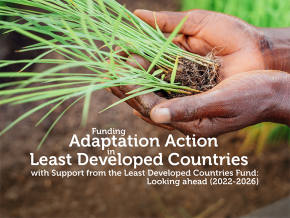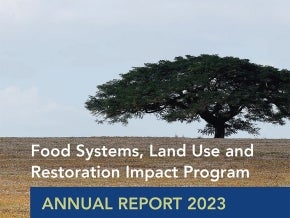
UNDP-supported climate information and early warning systems projects have reached 9.6 million people in the past 12 years. As we celebrate World Meteorological Day, we explore the power of information to supercharge progress toward the Sustainable Development Goals.
Information is power. Information can save lives. Information is the most important tool in our global efforts to address the climate crisis.
Across the globe, the United Nations Development Programme (UNDP) and its partners are working to improve climate information and early warning systems. This information can be used to inform improved and more effective climate actions. It can be used to help farmers change the way they plant, harvest, and take their products to market in our new climate economy. It can be used to build resilience for communities pushed to the breaking point by a rise in floods, droughts, extreme weather events, spiking temperatures, and other climate impacts.
As we commemorate World Meteorological Day, it’s important to look at impacts these projects have had on lives and livelihoods, and how future programs will extend climate services across the last mile to ensure no one is left behind as the UN supercharges its Decade of Action to reach the Sustainable Development Goals. Improved climate information and services are vital in accelerating the ambition of Nationally Determined Contributions to the Paris Agreement and UNDP’s Climate Promise. After all, information is power.
Impact
Since 2008, UNDP-supported climate information and early warning systems projects have reached a total of 9.6 million people. These vulnerable men, women, and children on the frontlines of climate change have benefited from increased access to climate information through 75 projects across 50 countries, including 33 least developed countries and 11 small island developing states.
The projects were made possible with the support of the Adaptation Fund (AF), Global Environment Facility (GEF), and Green Climate Fund (GCF). In all, nations were able to access over $738 million in finance from these vertical funds with UNDP supports, leveraging an additional $2 billion in co-finance.
Over the same 12-year period, UNDP supported nations to install over 800 automated weather stations and 245 early warning systems, and trained over 3,500 technicians and officials to use the improved data, build innovative systems, and ensure vital climate information makes its way to vulnerable end users who are struggling to adapt to our fast-changing climate.
Saving lives on Lake Malawi
Malawi offers just one example of the impact climate information is having on people’s lives and livelihoods.
"Natural hazards are many, especially because we go into the lake not knowing what kind of winds we will be facing. Strong winds find us in the lake, and a lot of fishermen in fishing canoes have lost their lives by drowning… [Climate information and early warnings] would help us a lot because we would have information on what the lake will be like on that day and be able to decide whether we should go in the lake or not. It would also save us money for fuel, and most importantly people would not lose their lives."
Boston Chuma, Fisherman from the Lifuwu Beach Village Committee in Malawi
For fishers like Boston Chuma, who makes his living plying the dangerous waters of Lake Malawi in an open canoe, early warnings are the difference between life and death. Over the past several years, UNDP has been working with the Government of Malawi to improve climate information and early warnings across the country.
The first supports came through a GEF-financed UNDP-supported project. The Government of Malawi is now scaling up the impact of that project to reach more than 3 million Malawians through the GCF-financed UNDP-supported M-Climes project. The project is designed to reach end-users across the last mile so they can use climate information to save lives, protect property and valuable infrastructure, and live more climate resilient lives. The project has already installed state-of-the-art lightning detection systems and weather-monitoring lake buoys. The buoys will send information directly to the Department of Climate Change and Meteorological Services who will generate safety advisors for fishers like Boston Chuma. It will also improve national decision-making to make evidence-based decisions on infrastructure, economic development, poverty alleviation efforts, and future investments in climate-proofing the future for Malawi’s most vulnerable citizens.
Partnering for the future
A number of partnerships globally are crowding-in resources to ensure every nation in the world has effective climate information and early warning systems.
Launched at COP25, the Alliance for Hydromet Development aims to ramp up action that strengthens the capacity of developing countries to deliver high-quality weather forecasts, early warning systems, water, hydrological, and climate services. The founding members of the Alliance for Hydromet Development are the Adaptation Fund, African Development Bank, Asian Development Bank, European Bank for Reconstruction and Development, Global Environment Facility, Green Climate Fund, Islamic Development Bank, United Nations Development Programme, United Nations Environment Programme, World Bank, World Food Programme, and World Meteorological Organization.
UNDP is also a member of the Risk-informed Early Action Partnership (REAP), which aims to make 1 billion people safer from disasters by creating a new partnership to greatly expand early action financing and improve early warning systems and the capacity to act on the risks they identify.
The future of climate services includes new rain fade, lighting, and cloud-sourced monitoring and reporting tools. Machines will learn and share climate information at the touch of a button, and satellites and drones will collect data. While the technology that will get us there is changing rapidly, the end goal remains the same: ensuring everyone everywhere can access the information they need to plan for and adapt to changing climate scenarios that are disrupting global economies, pushing people from their homes, and impacting the very future of human existence.
Impact on the frontlines
These stories feature the countries and people benefitting from UNDP projects:
- Lightning strikes: How installing a modern lightning detecting system in Malawi is saving lives and livelihoods
- Regaining old glories: Sierra Leone rebuilds its climate services from the ashes of war using new technologies to provide early warnings for vulnerable communities
- Weather ready, climate smart: Leveraging next-generation technologies, the Government of Liberia taps the private sector to build effective climate information and early warning systems
- Power to the farmers: Climate Information and Early Warnings to Save Lives and Build Resilience in Uganda
- Innovative climate data: Climate Information & Early Warnings to Save Lives and Build Livelihoods in Uganda
- Data-driven, climate resilient flood management: Enhancing hydro-meteorological monitoring in Bosnia & Herzegovina’s Vrbas River Basin
- Coming to grips with water: How Bhutan is overcoming water challenges magnified by the onset of climate change
- Improving meteorological services in Moldova: Tailoring severe weather warnings for decision makers and the public
- Moving with the times: The Cook Islands is embracing technology for climate action
More resources
- The GEF-funded Climate Information for Resilient Development in Africa programme (CIRDA) laid the ground work to build a ‘new vision’ for climate services in Africa.
- In Cambodia, climate information and early warnings are being used to update farming practices to adjust to changes in monsoon seasons and an increase in the frequency and severity of floods and droughts.
This piece was originally published on Exposure by UNDP Climate.


